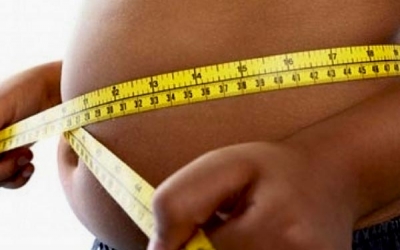- Latest news▼
-
15:11, April 24 Zombie deer disease possibly linked to hunters’ deaths

-
12:27, April 23 Appetite: Scientists found out the secret to the appeal of large portions of fast food

-
10:33, April 23 Scientists test new approach to fighting viruses

-
08:38, April 23 Ketamine may help with postpartum depression

-
22:12, April 22 Unhealthy amount of sugar found in baby food products of a well-known brand

-
19:41, April 22 Air pollution puts health of more than 1.6 billion workers globally at risk

-
17:25, April 22 Scientists found baked goods and lack of sleep to be more dangerous than alcohol

-
16:02, April 22 342 cases of measles recorded in Armenia so far in 2024

-
15:29, April 22 BrainStimulation: electrical brain stimulation alleviates anxiety and depression in the elderly

-
08:27, April 22 Cognitively stimulating jobs in midlife could lower dementia risk in old age, study finds

-
20:37, April 21 Environmental Health Perspectives: Microplastics ingested with food and water can spread from the gut to the brain

-
22:41, April 20 Scientists develop new method to safely stimulate immune cells to fight cancer

-
20:46, April 20 Blood test can determine who is at risk of developing multiple sclerosis - scientists

-
18:36, April 20 Next pandemic likely to be triggered by flu - scientists

-
12:16, April 19 Scientists grow human mini-lungs in lab

All materials
Obesity affects negatively on muscle mass and bone density

Obese patients have a greater risk of falling and breaking bones, a syndrome that researchers at Florida State University call osteosarcopenic obesity. The syndrome is the result of an all-too-common complication of obesity—deteriorating bone density and muscle mass, The Healthline.com reported.
“It used to be the thinking that the heavier you were, the better your bones would be,” said Jasminka Ilich-Ernst, a nutrition professor at Florida State. "But that’s only true to a certain extent.”
Years ago, Ilich-Ernst began searching for links between bone and muscle strength and fat mass. She said many scientists were looking at bone issues but failing to consider muscle mass and strength, as well as fat tissue.
She says that abdominal fat (which is more toxic than fat found in other places in the body) has a more negative impact on bone and muscle strength and can also boost inflammation. She said the medical community typically focuses on the impacts of obesity on the cardiovascular system and the risk for other illnesses; there isn't much focus on the impacts on bone density and muscle mass.
In her article, Ilich-Ernst considered data on 200 women who had had their muscle mass, bone density, and fat composition measured. She found that about one-third of them had more than 30 percent fat tissue plus declining bone density (osteopenia) and muscle mass (sarcopenia)—an especially serious problem for older women.
She says that people tend to gain weight and lose muscle mass and bone density as they age, but gaining a substantial amount of body fat can further impair muscle and bone function.
Dr. Charles W. Seltzer, a physician from Philadelphia who specializes in weight loss, said shedding pounds may help increase bone density, but the research to prove it is lacking.
Follow NEWS.am Medicine on Facebook and Twitter
- Related News
- Number of organ donors rises sharply on days of large-scale motorcycle rallies The number of organ donors increases...
- Scientists find explanation for rare type of heart inflammation in young people Genetic abnormalities may make some people more susceptible to myocarditis...
- Injection of bone marrow cells into spinal joints may relieve severe back pain The exosomes, which were only discovered in the 1980s...
- Researchers discover way to repair damaged fibers in spine Scientists have found a way to repair damaged fibers in the spine that don't recover...
- Researchers estimate likelihood of brain recovery in injured boxers after they stop fighting Boxers and mixed martial arts (MMA) fighters may show some recovery...
- Video
- Event calendar
- Archive
- Most read
month
week
day
- JAMA Oncology: Urine test can help rule out high-grade prostate cancer with almost 100% accuracy, study shows 1238
- Daily Mail: Elderly woman in China gets infected with brain-eating amoeba 1185
- Obesity: exercising before breakfast helps you lose weight faster 1165
- The Conversation: childhood trauma can cause pathological hoarding 1162
- Daily Mail: Satiating food reduces cravings for sweets, nutritionist says 1140
- Scientists grow human mini-lungs in lab 1130
- Next pandemic likely to be triggered by flu - scientists 826
- Scientists found baked goods and lack of sleep to be more dangerous than alcohol 747
- 342 cases of measles recorded in Armenia so far in 2024 708
- Blood test can determine who is at risk of developing multiple sclerosis - scientists 690
- Scientists develop new method to safely stimulate immune cells to fight cancer 686
- Cognitively stimulating jobs in midlife could lower dementia risk in old age, study finds 667
- BrainStimulation: electrical brain stimulation alleviates anxiety and depression in the elderly 620
- Air pollution puts health of more than 1.6 billion workers globally at risk 483
- Unhealthy amount of sugar found in baby food products of a well-known brand 476
- Find us on Facebook
- Poll





